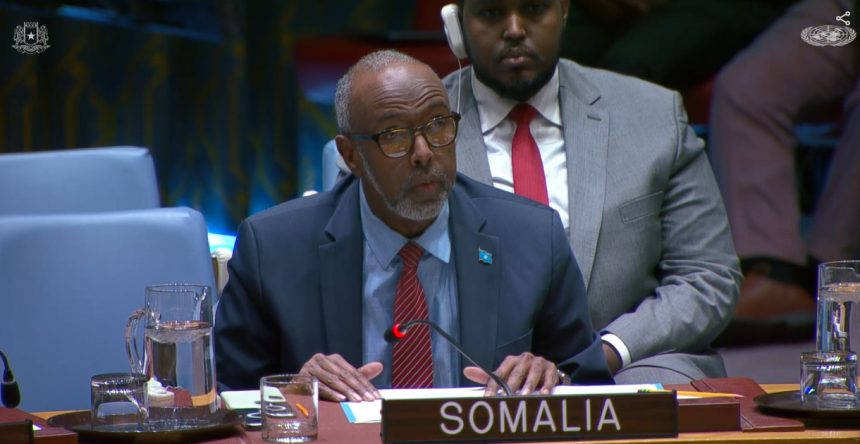MOGADISHU, SONNA: Somalia used its seat at the United Nations Security Council this week to deliver a clear warning about the future of peace and stability in West Africa and the Sahel. The message came during a briefing on peace consolidation, where Somalia’s Permanent Representative, Ambassador Abukar Dahir Osman, spoke with the weight of a country that knows what long conflict looks like.
His tone was steady, but the urgency was unmistakable. Terrorist networks in the Sahel are not only spreading. They are adapting, expanding, and finding new ways to undermine state authority. They cross borders with ease, disrupt supply routes, seize key economic assets, and even use drones and improvised explosive devices to strike with greater precision. It is a style of warfare that changes fast, often faster than governments can respond.
The ambassador made one point early and firmly. No single state can confront this alone. He called for stronger regional coordination, practical intelligence sharing, joint border operations, and rapid-response capabilities that match the speed and mobility of groups like JNIM, ISGS, and ISWAP. In his words, fragmentation only helps the very networks that threaten the entire region.
But what gave the speech its deeper impact was the lesson he carried from Somalia’s own experience. Military operations can clear territory, but they cannot hold it. Stability comes when governance shows up. It comes when citizens see the state return with justice, policing, services, and a promise of permanence. Somalia has learned that whenever those elements are missing, extremists step in and attempt to install their own control. The blockades in Mali and the attacks on vital transport corridors are recent examples of how quickly these groups exploit any governance vacuum.
Ambassador Abukar Osman stressed that the path out of violence requires more than force. Disarmament, demobilization, and reintegration programs matter. Opportunities for young people matter. Livelihoods and locally driven development matter. If communities feel abandoned, the cycle continues. If they feel seen, supported, and included, extremist recruitment loses its appeal.
International support formed the third pillar of his message. Countries in West Africa and the Sahel are often expected to mount huge counter-terrorism operations with unpredictable funding and shifting international attention. The ambassador pointed to Security Council resolution 2719 from 2023 as a tool that can help change this. The resolution allows for more predictable financing for African Union led peace operations. His appeal to the Council was simple. Put this framework to work and ensure that regional forces like the ECOWAS Standby Force and the Accra Initiative have the resources needed to succeed.
He also underlined that support must strengthen, not sideline, national governments. Sovereignty, regional frameworks, and international law are essential to any long-term solution. When international support aligns with national leadership, progress becomes achievable rather than theoretical.
In closing, Ambassador Abukar Osman offered something more personal. Somalia stands with the countries of West Africa and the Sahel because it has walked a similar road. It knows what it means to fight an enemy that blends into communities and thrives on despair. It knows how long it takes to rebuild trust where violence once ruled. And it is ready to share lessons learned and deepen cooperation across the African Union, ECOWAS, and the United Nations.
There were no promises of quick wins. Just a steady reminder that in regions battered by conflict, unity is not a slogan. It is the only strategy with a real chance of lasting.





